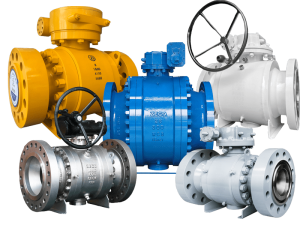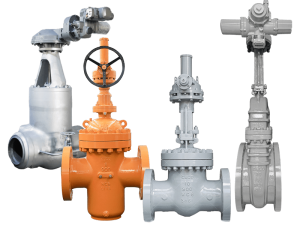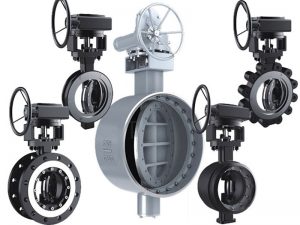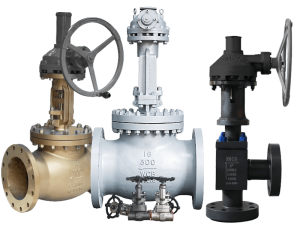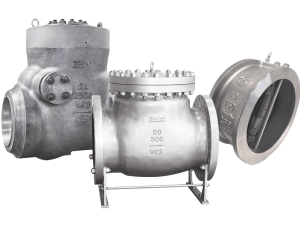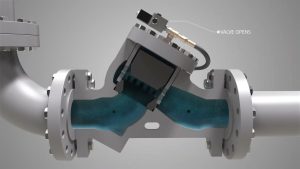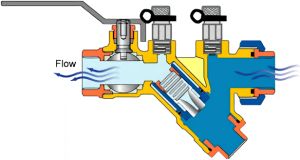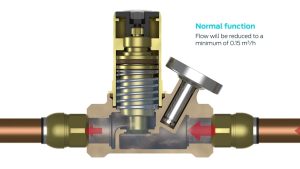Globe valve, also called stop valve, is one of the most widely used valves. It is popular due to the small friction between the sealing surfaces in the process of opening and closing, relatively durable, small opening height, easy manufacturing and maintenance. It is not only suitable for medium and low pressure, but also for high pressure.
Working principle of globe valve
Generally, the stem of globe valve is rotated and lifted, and the handwheel is fixed on the top of the stem. When the handwheel is rotated clockwise, the stem thread is screwed down, the sealing surface of the disc is in close contact with the valve seat, and the globe valve is closed. When the handwheel is rotated counterclockwise, the stem thread is screwed up, the sealing surface of disc and valve seat is separated, and the globe valve is opened.
Features of globe valve
Advantages of globe valve
a.Compared with the gate valve, the globe valve is simple in structure with only one sealing surface on the valve body and disc. The sealing area is small, no expensive materials are used, with low cost, so the manufacturing process is relatively good, and it is simple to maintain.
Disadvantages of globe valve
- a. The length of the structure is large.
- b.The opening and closing torque is large, and it takes time to open and close. When the valve is closed, the movement direction of the disc is opposite to the action direction of the medium pressure, and the force of the medium must be overcome, so the opening and closing torque is large.
- c.The flow resistance is large. The medium channel in the valve body is tortuous, the flow resistance is large, and the power consumption is large. In the hydraulic device, the pressure loss is particularly obvious. Among all kinds of block valves, the block valve has the largest flow resistance.
- d. The flow direction of the medium is limited. When the medium flows through the globe valve, it can only flow from the bottom to the top or from the top to the bottom at the valve seat channel, so the medium can only flow in one direction and can not change the flow direction.
- e.When the valve is closed, solid particles in the fluid medium may be trapped between the sealing surfaces
- f. Inconvenient installation.
Operation characteristics of globe valve
The sealing form of globe valve is forced sealing. When the valve is closed, sufficient force must be applied to the valve disc to achieve the effect of sealing, and the sealing can be realized only when the specific pressure is sufficient.
Sealing force and medium pressure are on the same axis. When the medium enters from the lower part of the valve disc (low in and high out), the closing torque of the valve is greater than the opening torque due to the opposite direction of the medium pressure and the sealing force, and the maximum stress on the valve rod is the pressure stress, so there must be sufficient strength and rigidity, otherwise the valve rod will be deformed.
Therefore, when the size of the globe valve is larger than DN150 (NPS 6), in order to reduce the operating torque of the valve and reduce the diameter of the valve stem, the medium is usually flowed to the upper part of the valve disc to enter (high in and low out). At this time, the direction of medium pressure and sealing force is the same. Under the action of medium pressure, the valve can be sealed more easily. The closing torque decreases and the opening torque increases, the maximum stress on the valve stem is tensile stress, and the valve stem diameter can be reduced accordingly.
When the globe valve is opened, when the opening height of the disc reaches 25-30% of the nominal size of the valve, the flow has reached the maximum, that is, the valve has reached the full open position, so the full open position of the globe valve should be determined according to the stroke of the disc.
When the globe valve is closed and reopened, it is similar to the forced seal gate valve, that is, after the valve is closed, sufficient operating force shall be applied on the sealing surface to achieve the effect of sealing. Therefore, the closing torque of the valve should be increased to the specified value based on the operating torque. When the valve is opened again, the opening torque of the valve is usually larger than the closing torque due to the influence of static friction, thermal expansion and other factors, thus, the valve can be opened reliably, and it should be considered in the design.
In order to reduce the high impact pressure formed in the opening and closing valve, the globe valve should be operated slowly, in a sense, it should have a rate of change consistent with the flow rate.
The operating torque of the globe valve has the following characteristics:
“Low inlet and high outlet openings”
When “low inlet and high outlet” is adopted, the valve is closed from the fully open position. The resistance that the operating force needs to overcome is the friction resistance of the stem and packing and the thrust caused by the medium pressure on the disc section (axial). With the falling of the valve disc, the pressure difference between the front and the back of the valve disc is formed, which prevents the valve disc from falling, and the resistance will increase rapidly with the falling of the valve disc. With the valve completely closed, exerts a forced sealing force is applied by the valve rod, and the pressure difference between the front and back of the valve disc reaches the maximum working pressure of the medium, at this time, the valve rod bears the maximum closing torque.
During valve opening, medium pressure, or thrust caused by pressure difference between front and back of disc the same as direction of closing valve. However, it should be noted that at the moment of opening, the opening operating torque may exceed the closing torque due to the large static friction torque between sealing surfaces.
“High inlet and low outlet openings”
When “high inlet and low outlet” is adopted, the valve is closed from the fully open position. The above two forces are still needed to overcome the operating force. With the decrease of the valve disc, the pressure difference before and after the valve disc is conducive to the valve closing before the valve is closed.
When the valve is opened, the situation is just the opposite. The thrust caused by the medium pressure and the pressure difference between the front and the back of the disc is opposite to the opening direction of the valve, so the operating torque required for the opening process of the valve is much larger than the closing torque.

